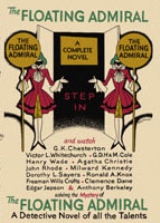
The Floating Admiral
Encyclopedia
The Floating Admiral is a collaborative detective novel written by fourteen members of the Detection Club
in 1931. The twelve chapters of the story were each written by a different author, in the following sequence: Canon Victor Whitechurch
, G. D. H. Cole
and Margaret Cole
, Henry Wade, Agatha Christie
, John Rhode, Milward Kennedy
, Dorothy L. Sayers
, Ronald Knox
, Freeman Wills Crofts
, Edgar Jepson
, Clemence Dane
and Anthony Berkeley. G. K. Chesterton
contributed a Prologue, which was written after the novel had been completed.
As Sayers explained in the introduction to the book, "Each writer must construct his instalment with a definite solution in view—that is, he must not introduce new complications merely 'to make it more difficult' ... [E]ach writer was bound to deal faithfully with all the difficulties left for his consideration by his predecessors."
Detection Club
The Detection Club was formed in 1930 by a group of British mystery writers, including Agatha Christie, Dorothy L. Sayers, Freeman Wills Crofts, Arthur Morrison, John Rhode, Jessie Rickard, Baroness Emma Orczy, R. Austin Freeman, G.D.H. Cole, Margaret Cole, E.C. Bentley, and H.C. Bailey. Anthony...
in 1931. The twelve chapters of the story were each written by a different author, in the following sequence: Canon Victor Whitechurch
Victor Whitechurch
Victor Lorenzo Whitechurch was a Church of England clergyman and author.He wrote many novels on different themes. He is probably best known for his detective stories featuring Thorpe Hazell, which featured in the Strand Magazine, Railway Magazine, Pearson's and Harmsworth's Magazines...
, G. D. H. Cole
G. D. H. Cole
George Douglas Howard Cole was an English political theorist, economist, writer and historian. As a libertarian socialist he was a long-time member of the Fabian Society and an advocate for the cooperative movement...
and Margaret Cole
Margaret Cole
Dame Margaret Isabel Cole, DBE was an English socialist politician.Daughter of John Percival Postgate and Edith Allen, Margaret was educated at Roedean School and Girton College, Cambridge. While at Girton, through her reading of H. G...
, Henry Wade, Agatha Christie
Agatha Christie
Dame Agatha Christie DBE was a British crime writer of novels, short stories, and plays. She also wrote romances under the name Mary Westmacott, but she is best remembered for her 66 detective novels and 14 short story collections , and her successful West End plays.According to...
, John Rhode, Milward Kennedy
Milward Kennedy
Milward Rodon Kennedy Burge was an English civil servant, journalist, crime writer and literary critic. He was educated at Winchester College and New College, Oxford. He served with British Military Intelligence in World War I and then worked for the International Labor Office and the Egyptian...
, Dorothy L. Sayers
Dorothy L. Sayers
Dorothy Leigh Sayers was a renowned English crime writer, poet, playwright, essayist, translator and Christian humanist. She was also a student of classical and modern languages...
, Ronald Knox
Ronald Knox
Ronald Arbuthnott Knox was an English priest, theologian and writer.-Life:Ronald Knox was born in Kibworth, Leicestershire, England into an Anglican family and was educated at Eton College, where he took the first scholarship in 1900 and Balliol College, Oxford, where again...
, Freeman Wills Crofts
Freeman Wills Crofts
Freeman Wills Crofts was an Irish mystery author, one of the 'Big Four' of the Golden Age of Detective Fiction.-Birth and education:Crofts was born at 26 Waterloo Road, Dublin, Ireland...
, Edgar Jepson
Edgar Jepson
Edgar Alfred Jepson was an English writer, principally of mainstream adventure and detective fiction, but also of some supernatural and fantasy stories that are better remembered. He used a pseudonym R...
, Clemence Dane
Clemence Dane
Clemence Dane was the pseudonym of Winifred Ashton , an English novelist and playwright.-Life and career:...
and Anthony Berkeley. G. K. Chesterton
G. K. Chesterton
Gilbert Keith Chesterton, KC*SG was an English writer. His prolific and diverse output included philosophy, ontology, poetry, plays, journalism, public lectures and debates, literary and art criticism, biography, Christian apologetics, and fiction, including fantasy and detective fiction....
contributed a Prologue, which was written after the novel had been completed.
As Sayers explained in the introduction to the book, "Each writer must construct his instalment with a definite solution in view—that is, he must not introduce new complications merely 'to make it more difficult' ... [E]ach writer was bound to deal faithfully with all the difficulties left for his consideration by his predecessors."

